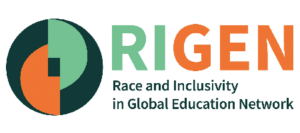Summary
An introduction to the Race and Inclusivity in Global Education Network (RIGEN) blog series and how we hope to use it to raise awareness and contribute to knowledge exchange on the subject of race and inclusivity in education at all levels.
 By Omolabake Fakunle, Jingyi Li, and Marlies Kustatscher (RIGEN Co-Conveners)
By Omolabake Fakunle, Jingyi Li, and Marlies Kustatscher (RIGEN Co-Conveners)
Our introductory blog to the Race and Inclusivity in Global Education Network (RIGEN) blog series foregrounds our interest in raising awareness and knowledge exchange on the subject of race and inclusivity in education at all levels. The series will share insights from stakeholders in education from a range of backgrounds and disciplines, thus demonstrating the multifaceted and far-reaching implications and the impact of racial constructions on lived experiences, both anecdotally, and research based.
This blog series is consistent with RIGEN’s aims in forging multicultural and interdisciplinary approaches to conducting research to inform policy and to make an impact in our communities. Our vision positions us leading in race/cultural inclusivity research at all levels of education, and conversations on issues on the topic. Our members’ research undertakings span national and international as well as formal and informal educational contexts. Our work ranges from the early years to higher education. RIGEN emanates from a shared critical approach to conceptualisations of race and the impact on current world order and education systems within and beyond national borders. We are building on the legacy of the Centre for Education for Racial Equality in Scotland’s (CERES) impactful work on race and anti-racist education.
CERES was established in 1991 to take forward race equality work for the schools sector in Scotland. It was set up at a time where Scotland still had a view of ‘nae problem here’. In 2022, after 31 years, the activities of CERES had expanded and it was time to set up the next iteration of our work in the form of RIGEN.
Like CERES, a key pillar of RIGEN is to connect with key stakeholders and populations – children and young people, educators and practitioners, policy makers – to learn with and from each other and to collaboratively work towards more inclusive educational practice and policy at all levels and across different contexts.
As shared at our launch event on 9 September 2022 (see video), our logo puts what is around us at our core, regardless of who we are or where we may be in terms of our understanding of the issues around race, racism, and anti-racist education. The panellists at our launch shared insights and research in race and inclusion studies, decolonisation of curriculum and inclusivity in research methodology. We aim for RIGEN to continue to stimulate conversations which build a fertile ground for further discussions and generate a commitment to use our knowledge to spur action.
Our theoretical approach recognises that ‘race’ is a social construct based in colonial thought which continues to have real-life implications for how groups and individuals become racialised in today’s world. Our approach to inclusivity emphasises the need for inclusive processes, policies, practices and systems rather than a focus on only individual experiences. Our members draw on conceptual frameworks located in critical theories, social justice and approaches to engage in the study of race and inclusivity in education. Such frameworks may include critical race theory, intersectionality, anti-racism, decolonial thought, feminist and queer theory, rights and participation. We aim for our research and knowledge exchange activities to critically examine systemic and institutionalised forms of prejudice and discrimination, that privileges hegemonic constructions of knowledge, knowing, and being.
The RIGEN blog series takes its steer from the successful CERES blog series which has been well received over the years. This blog series is intended to raise issues relating to promoting race equality, inclusivity, and anti-racism within education in general. Contributors to the blogs are invited to share their perspectives or research related to race, anti-racism and inclusivity in education. We welcome blogs from academics and practitioners that discuss examples of improving practice or raise discussions about conundrums or discomforts.
If you would like to become involved in the work of RIGEN, hear more about or ongoing projects and events, or contribute to the blog series, please get in touch (RIGEN@ed.ac.uk). We would be delighted to hear from you.
We are very grateful to the RIGEN blog series editors, Rowena Arshad, Jite Eferakorho, and Jonathan Hancock, for their work and contribution.
We hope the blogs provide spaces for much-needed disruption and transformation. We are committed to building a fertile ground for further discussion and using collective knowledge to spur action to use our research to inform policies and practices to make education at all levels truly inclusive for all.


